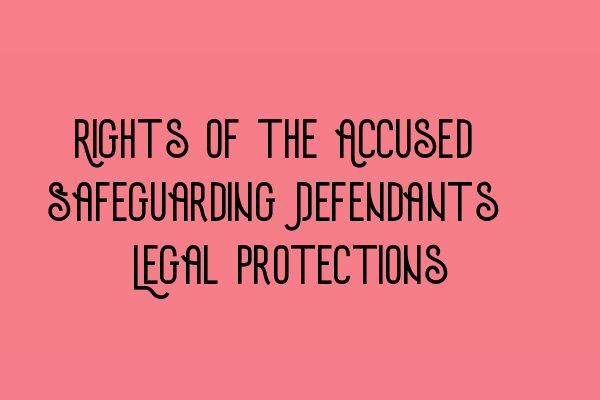Rights of the Accused: Safeguarding Defendants’ Legal Protections
Being accused of a crime can be an overwhelming and distressing experience. Whether you are facing a minor charge or a serious offense, it is crucial to understand your rights as an accused individual. The legal system provides several protections to safeguard defendants and ensure a fair trial.
Presumption of Innocence
In criminal law, the accused is presumed innocent until proven guilty. This fundamental principle serves as the foundation of the criminal justice system. It means that the burden of proof lies with the prosecution to prove beyond a reasonable doubt that the accused committed the alleged offense. The presumption of innocence helps ensure that no one is wrongfully convicted.
If you are preparing for the SQE 1 exam, you may find it helpful to test your knowledge with SQE 1 Practice Exam Questions or take SQE 1 Practice Mocks FLK1 FLK2 to enhance your understanding of criminal law.
Right to Legal Representation
One of the most crucial rights enjoyed by the accused is the right to legal representation. It is essential to have a solicitor to provide advice and guidance throughout the legal process. If you cannot afford a lawyer, the court will appoint one for you. Your solicitor will work diligently to protect your rights, gather evidence on your behalf, and present a strong defense.
If you are interested in preparing for the SQE 2 exam, consider enrolling in SQE 2 Preparation Courses that can help you master the necessary skills and knowledge for a successful career in criminal law.
Right to Silence
The right to silence allows the accused to remain silent and not incriminate themselves during the investigation and trial. You cannot be compelled to answer any questions or provide evidence against yourself. This protection ensures fairness and prevents self-incrimination. However, it is crucial to consult with your solicitor to understand the implications and potential consequences of remaining silent.
Presentation of Evidence
In court, both the prosecution and the defense have the opportunity to present their evidence. The accused has the right to challenge the evidence presented against them and cross-examine witnesses. This right ensures that the accused can question the credibility and reliability of the evidence brought forward by the prosecution.
Fair Trial
Every accused individual has the right to a fair trial conducted by an impartial and independent court. This includes the right to be heard, the right to an attorney, the right to confront witnesses, and the right to present evidence. A fair trial ensures that the accused is given a fair opportunity to defend themselves and that the proceedings are conducted justly.
If you are preparing for the SQE 1 exam, taking SQE 1 Practice Exam Questions or SQE 1 Practice Mocks FLK1 FLK2 can greatly improve your understanding of the rights of the accused and the principles of a fair trial.
Conclusion
The legal protections for the accused play a vital role in ensuring justice and fairness in criminal proceedings. Understanding your rights as an accused individual is crucial for a fair trial. If you are pursuing a career in criminal law, it is essential to have a solid understanding of the rights of the accused. Preparing for the SQE exams, such as SQE 2 Preparation Courses and SQE 1 Preparation Courses, can greatly enhance your knowledge and readiness for a successful legal profession.
For more information on SRA SQE exam dates, please refer to SRA SQE Exam Dates.
